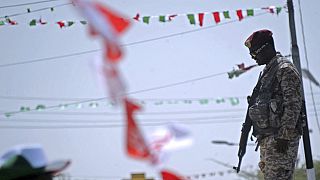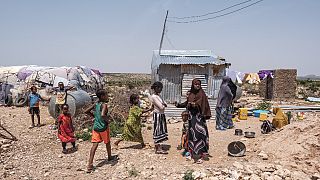UNHCR
About 100,000 people fleeing fighting in Somaliland, Somalia's self-declared independent region, have taken refuge in a month in a remote area of Ethiopia already suffering from severe drought, the UN and Ethiopian refugee agencies announced Tuesday.
Citing authorities in the Doolo administrative zone, part of Ethiopia's Somali region and located at the southeastern tip of the country, more than 1,300 km off the bad road from Addis Ababa, the UN High Commissioner for Refugees (UNHCR) estimates that 98,000 people have arrived in three woredas (districts) bordering Somaliland since February 6.
"We will corroborate these figures" with the registration that has started, Tesfahun Gobezay, director general of the Refugees and Returnees Service (RRS), an Ethiopian government agency, said at a press conference in Addis Ababa with Mamadou Dian Balde, UNHCR representative in Ethiopia.
The latest figures available on Monday show that "29,000 refugees have already been registered and the numbers are increasing", he said, adding that the refugees were "mainly women and children".
If their number is confirmed, the arrival of these refugees will swell by 40% the population of the three woredas concerned, about 236,000 people who are already suffering severely from the drought affecting their region and more broadly part of the Horn of Africa.
"It is an area lacking infrastructure and with little socio-economic development, which has been struggling with a drought for four years," Tesfahun recalled. However, its inhabitants, "affected by the drought and various challenges, were the first to help" the refugees, "even before we arrived, they hosted them in their homes and shared their little food.
Shelter, food, water, medical aid: the needs are numerous and "quite urgent", underlined Mr. Dian Balde, considering "very important that our support does not only take into account the refugees, but also their hosts".
Moreover, the refugees "tell us: 'we want to go home'. They are not people who want to remain refugees (...) They are therefore also calling for finding ways, solutions to the current problem (in Somaliland) so that people can return home," he insisted.
Formerly a British territory, Somaliland unilaterally declared its independence from Somalia in 1991, when the country was plunging into chaos from which it has not yet emerged. Although it has its own institutions, Somaliland has never had its independence recognized by the international community.
Somaliland enjoyed relative stability until rising political tensions in recent months triggered hostilities between Somaliland forces and militias from the neighbouring Somali region of Puntland on February 6.
Before the arrival of the Somaliland refugees, Ethiopia, with a population of about 120 million, was already hosting more than 880,000 refugees, mostly from South Sudan, Somalia, Eritrea and Sudan, according to the UNHCR.












02:35
Sudanese Refugee Children Find Hope in Libyan School
01:05
Sudan: fire in Darfur refugee camp destroys 50 houses, no casualties reported
Go to video
UN refugee chief urges support as Sudan crisis spills into Chad
Go to video
Kenya's ambitious plan to turn Kakuma refugee camp into a city
01:36
WFP cuts food rations as new refugee arrivals test its Burundi operations
01:48
Sudanese Refugee finds home in Mogadishu during Ramadan